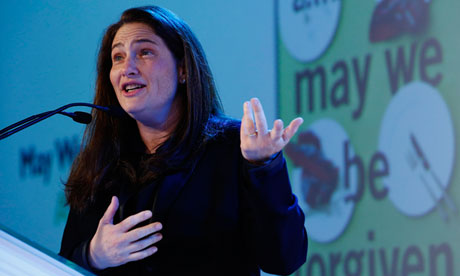May We Be Forgiven, AM Homes's sardonic and tender novel, sees off the competition on a love-them-or-hate-them list

AM Homes, author of May We Be Forgiven, speaks at the Royal Festival Hall after winning the 2013 Women's prize for fiction. Photograph: Luke Macgregor/Reuters
It's hard to imagine AM Homes, whose fiction mines a blackly comic seam of horror and alienation in American suburbia, as a compromise candidate. Though her work has mellowed since the publication of The End of Alice, the notorious novel about paedophilia that made her name, there's still likely to be a severed ear under every white picket fence.
Yet it must be said that two of the other frontrunners in an incredibly strong shortlist have sharply divided readers. Zadie Smith's NW has passionate supporters for its whip-sharp dialogue and playful experimentalism, but critics called it baggy and ill-plotted; Kate Atkinson's Life After Life dazzled fans with its profusion of possible realities, but some couldn't suspend their disbelief in a book where anything could happen – up to and including a walk-on part for Hitler.
If these were love-them-or-hate-them novels, Hilary Mantel's Booker- and Costa-winning Bring Up the Bodies had already had a great deal of love indeed. The judges were right to shortlist it, but a win could only have led to a collective shrug.
May We Be Forgiven, on the other hand, divides each reader between laughing and wincing. It's a picaresque satire of modern America, with all its anomie and family dysfunction, empty consumerism and sexting, which moves towards wholeness and redemption – to building a new family around yourself when your own implodes.
Anti-hero Harold loses a numb marriage and a steady life when his hated brother tips into madness, but he also accrues various orphans, pets, eccentric girlfriends and substitute parents, as well as a sense of purpose.
Therapy culture is mercilessly skewered; everyone is on medication. The comedy is as dark as ever – in AM Homes, a bad Thanksgiving dinner leads not to stony silences over the washing up but adultery, murder and violent insanity – yet by the end the mood is uplifting, even rose-tinted. It is a book both sardonic and tender, like an edgier version of Jonathan Franzen. Homes has called it "a novel of second chances".
Like Franzen, Homes is staking her claim to the Great American Novel, a genre not rich in female authors. As friend and fan Jeanette Winterson points out, she is "a woman writing dangerously, provocatively, about boys and men, and using the male persona". Don DeLillo and John Cheever haunt these pages, while the unlikely passion of her narrator is the rehabilitation of Richard Nixon.
Its greatest recommendation, though, may have been its sheer what-next addictive readability. One reviewer compared the experience to "gorging on a DVD boxset", and it's no coincidence that Homes has been writing for TV shows such as The L Word. May We Be Forgiven offers the excitements of a writer who will break any taboo – including the one around sentimentality.
Yet it must be said that two of the other frontrunners in an incredibly strong shortlist have sharply divided readers. Zadie Smith's NW has passionate supporters for its whip-sharp dialogue and playful experimentalism, but critics called it baggy and ill-plotted; Kate Atkinson's Life After Life dazzled fans with its profusion of possible realities, but some couldn't suspend their disbelief in a book where anything could happen – up to and including a walk-on part for Hitler.
If these were love-them-or-hate-them novels, Hilary Mantel's Booker- and Costa-winning Bring Up the Bodies had already had a great deal of love indeed. The judges were right to shortlist it, but a win could only have led to a collective shrug.
May We Be Forgiven, on the other hand, divides each reader between laughing and wincing. It's a picaresque satire of modern America, with all its anomie and family dysfunction, empty consumerism and sexting, which moves towards wholeness and redemption – to building a new family around yourself when your own implodes.
Anti-hero Harold loses a numb marriage and a steady life when his hated brother tips into madness, but he also accrues various orphans, pets, eccentric girlfriends and substitute parents, as well as a sense of purpose.
Therapy culture is mercilessly skewered; everyone is on medication. The comedy is as dark as ever – in AM Homes, a bad Thanksgiving dinner leads not to stony silences over the washing up but adultery, murder and violent insanity – yet by the end the mood is uplifting, even rose-tinted. It is a book both sardonic and tender, like an edgier version of Jonathan Franzen. Homes has called it "a novel of second chances".
Like Franzen, Homes is staking her claim to the Great American Novel, a genre not rich in female authors. As friend and fan Jeanette Winterson points out, she is "a woman writing dangerously, provocatively, about boys and men, and using the male persona". Don DeLillo and John Cheever haunt these pages, while the unlikely passion of her narrator is the rehabilitation of Richard Nixon.
Its greatest recommendation, though, may have been its sheer what-next addictive readability. One reviewer compared the experience to "gorging on a DVD boxset", and it's no coincidence that Homes has been writing for TV shows such as The L Word. May We Be Forgiven offers the excitements of a writer who will break any taboo – including the one around sentimentality.
No comments:
Post a Comment